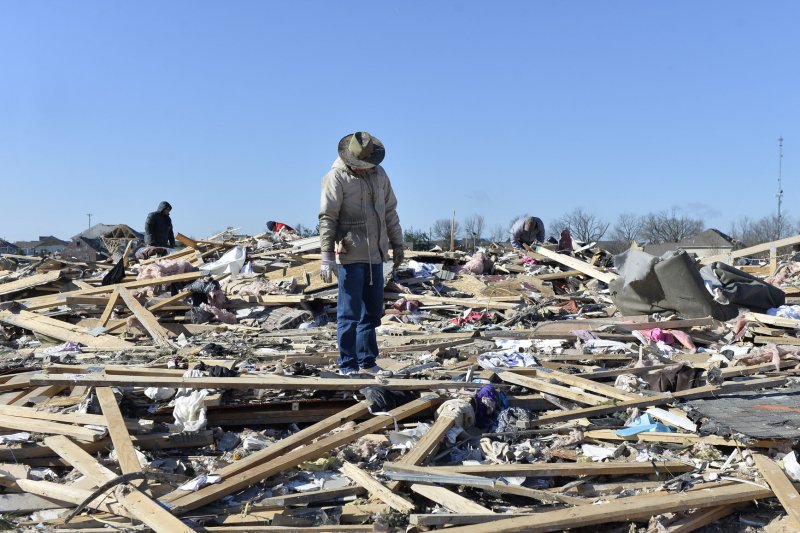Residents sort through the devastation following a tornado in Washington, Illinois on November 18, 2013. A new report by Brown University says although veterans receive sufficient support in the treatment of PTSD, non-veterans, who may experience trauma through natural disaster, crime or accidents, lack such resources. File Photo by Brian Kersey/UPI |
License Photo
PROVIDENCE, R.I., Dec. 19 (UPI) -- Non-veterans with post-traumatic stress disorder are less exposed to information and treatment options than combat veterans, a new study reveals.
In a report published Friday in the Harvard Review of Psychiatry, researchers from Brown University say those affected by PTSD from sexual assault, child abuse, natural disasters and other non-military incidents have limited access to helpful resources.
"There really isn't an organized body of research that generates guidance for how [civilians affected by PTSD] and their caregivers should deal with their PTSD," lead author Judith Bentkover said in a statement.
The study, executed by Bentkover and seven team members, also observed the limited amount of research on specific instances and groups of people with PTSD. Bentkover said the amount of research on PTSD treatment in non-veterans is limited, lacking support from a larger governing body with the ability to organize, translate and execute treatment options to more patients, like the U.S. Department of Veterans Affairs.
"The best PTSD treatment model we have can be found within the VA," Bentkover continues. "Kids have PTSD. Women have PTSD. It's not just a disease of veterans, although they are a very important and poignant cohort of people who have it. Sexual assault victims, abused children, survivors of natural disasters do not necessarily have a VA to go to. What do they do?"
From reviewing academic, economic and consumer-oriented literature on civilian PTSD treatment, researchers found there were not enough comparative resources to help aid patients and caregivers in their own research.
"Caregiver and patient-centered Internet searches for PTSD treatment programs and support resources located sites that were often rich in information but not necessarily organized to facilitate consumer decision making," the study reads. "Generally speaking, consumer websites could perform several key functions more effectively, such as simplifying complex evidence regarding treatments, identifying areas of consensus versus controversy, and providing concrete tips for navigating among the different treatment options and providers."
Study authors provided several suggestions they believe can improve the accessibility of information and research to civilians, including expanding research efforts in more specific areas, establishing a standard process of organizing such research and building an institution which can act as a hub for civilians affected by PTSD to access necessary resources.















